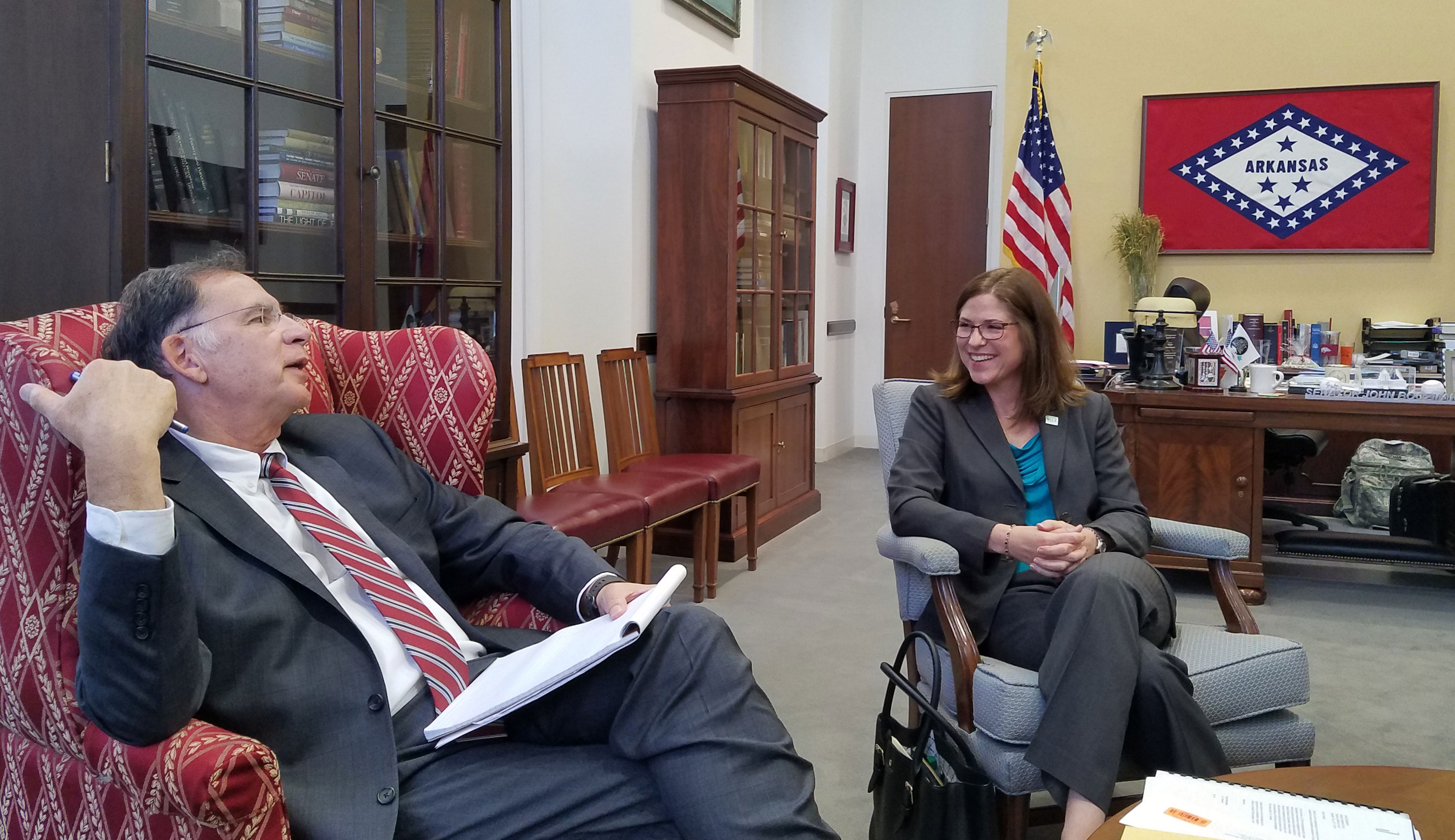 AR rice farmer Jennifer James meets with home state Senator John Boozman
AR rice farmer Jennifer James meets with home state Senator John Boozman
Jul 25, 2017
WASHINGTON, DC – This morning the Senate Committee on Agriculture, Nutrition & Forestry held a hearing entitled “Commodities, Credit, and Crop Insurance: Perspectives on Risk Management Tools and Trends for the 2018 Farm Bill.” The hearing focused on the three aforementioned titles of the farm bill that comprise the farm safety net. Jennifer James, an Arkansas rice farmer and chairman of the USA Rice Sustainability Committee, testified on behalf of the U.S. rice industry. A total of seventeen witnesses participated in the hearing representing all major agricultural commodities, the crop insurance industry, and farm credit and financial experts.
James’s testimony focused on the substantial economic and environmental benefits generated by the U.S. rice industry and how the farm safety net allows farm families like hers to operate in the down cycle, when times are tough and prices are low.
“Rice farms act as economic drivers for their communities, generating on average one million dollars per farm each year in our local economies,” said James. “Unfortunately, many of our growers have been forced to operate at or below their cost of production for the last three years.”
Operating costs for rice exceed every other crop covered by the Commodity Title – and, according to the U.S. Department of Agriculture (USDA), the 2018 crop year is forecast to have some of the highest production costs on record – nearly $1,000 per acre for rice. For that reason, and because specialized infrastructure, field equipment, soil types, and weather preclude a shift to other crops, rice farmers are in it for the long haul but, James reiterated, need the safety net that the Price Loss Coverage (PLC) program provides.
“Title 1 particularly affects my farm’s ability to survive market depressions and any number of natural disasters. We need to get it right,” said James. “It’s safe to say that one of the reasons I’m still in business, along with the majority of rice farming families, is because of the 2014 Farm Bill’s safety net, specifically PLC. Ninety-nine percent of long grain rice farms and 94 percent of medium grain farms selected PLC – and it has in fact provided critical counter-cyclical assistance when needed most.”
James suggested Congress could make PLC even more effective for rice farmers by updating it to reflect rising production costs and inflation, and to accelerate the delivery of assistance closer to harvest.
Another area of concern for farmers is the Actively Engaged in Farming regulations. The strict definitions contained in the regulations impact farms not solely comprised of lineal family members and impose an arbitrary cap of three managers per operation. USDA’s final rule does not protect entities from maintaining “family farm” status in the event of the death or retirement of a family member, which has resulted in the disqualification of true family members who have an active role in the operation’s survival.
“My son and his first cousins, who dream of tilling the land their great-great grandfather purchased in the late 1800s, may have to downsize because those cousins are not considered true family members since their dad, my brother, no longer farms,” said James. “I would suggest an exemption within the regulations to mitigate against unforeseen family linkage breaks in operating structure.”
James noted that the Adjusted Gross Income (AGI) means test should be repealed. “The farm bill shouldn’t punish growers for farming larger tracts of land or being profitable by disqualifying their operations from farm safety net programs,” she said.
In response to a question from Senator Heidi Heitkamp (D-ND) on trade challenges, James noted the need for opening new markets like Cuba, challenging unfair trade practices among our rice competitors, and maintaining funding for the USDA Foreign Agricultural Service export promotion programs. When asked by Senator Joe Donnelly (D-IN) to shed light on why conservation programs are important to rice farmers, James touted the rice industry's track record on conservation and sustainability, and the major contributions to wildlife habitat.
In closing, James said, “Farm families take on incredible financial risks each year in the face of often distorted global markets, unpredictable weather, disease, and other challenges. We do this because we love it and if it were up to us as farmers, we would prefer to prosper only by the prices our crops bring at the market. But commodity markets aren’t always kind. Right now our crops are simply not bringing enough to pay our bills without the assistance of the 2014 Farm Bill safety net. I am here to ask for this Committee’s consideration in not only maintaining our Commodity Title programs, but strengthening it.”